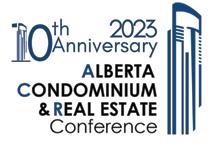
ALBERTA CONDO connections A GOOD START: Anticipated amendments to Alberta’s Condominium Legislation Summer 2023
condo corporations:
the
and
to keep it from
Self-managed
The good,
bad,
ways
getting ugly What is insurance against fraud?
COF Membership, JOIN US!

Enjoy access to a range of member benefits and support an organization whose mission is networking condo owners throughout the province of Alberta.
Membership includes newsletters and updates, advocacy reports, access to Condo Owners Forum, articles, and member prices for educational opportunities, webcasts, and seminars. This is all available for a low annual membership fee.
COF advocates for better, fair, and transparent condominium legislation to all levels of government and stakeholders. The more of you there are, the stronger your/our voice is!
For more information please email membership@cofsab.ca or check us out at www.cofsab.ca/membership-account/membership-levels/
A Unique Approach for your community
Your project today becomes your achievement tomorrow. We provide unmatched services with a customized approach to increase your community’s lifestyle, livability and value. Our professionals live and work in the communities we serve, providing the local industry expertise you need.
As your trusted advisors, we start our journey together with the same goal; increasing the value of your investment.
Our benefit to you:
We offer value-added services available only to our clients. To ensure a smooth transition, we handle onboarding, and a dedicated account manager served by our accounts payable and receivables and finance team.
Our partner affiliates and vendors give you access to a broad depth of resources, ensuring everything runs smoothly and your community way of life is protected.
Our difference is personalized service through a community manager who is backed by an entire team ensuring:
f Technology at your fingertips
» FirstService Residential Connect™ proprietary software connecting homeowners, board members, management team

» Mass communication capability keeping residents informed
f Financial management & responsibility
» Avoid cash-flow problems
» Prepare for market changes
» Plan renovations & capital improvements
f Energy solutions: Reduce costs
» Energy experts recommend strategies to reduce consumption, costs, emissions
» Tailored solutions for your community
f 24/7/365 support centre: Round-the-clock support
» Residents and homeowners receive immediate answers to their inquiries
» Reduced administrative time for community managers

f Banking & insurance: Financial guidance
» FirstService Financial Inc. offers exclusive financial and insurance services to our clients only
To learn more visit us at www.fsresidential.com/alberta or scan the QR code. Or call, we’d love to hear from you. 587.393.1290.
PROPERTY MANAGEMENT: www.fsresidential.com/alberta April 2023
~ Glenne Manlig, President, FirstService Residential Alberta.
4 ALBERTA CONDO CONNECTIONS is published by DEL Communications Inc. Suite 300, 6 Roslyn Road Winnipeg, Manitoba, Canada R3L 0G5 PRESIDENT & CEO David Langstaff MANAGING EDITOR Shayna Wiwierski shayna@delcommunications.com ADVERTISING SALES MANAGER Dayna Oulion dayna@delcommunications.com ACCOUNT REPRESENTATIVES Brent Astrope | Gary Barrington Mic Paterson | Gary Seamans PRODUCTION SERVICES S.G. Bennett Marketing Services CREATIVE DIRECTOR / LAYOUT & DESIGN Kathleen Cable COVER PHOTO Rio Vista Villas Condominium Lethbridge Provided by Phil Rosenzweig CONTRIBUTING WRITERS Dianne E. Allen | Erin Berney Wayne Boss | Gary Caouette Mark DiPinto | Neil Holatko Kate Kelly | Michelle Lucente David Minifie | Maryam Musbah Sherry Bignell ©DEL Communications Inc. – All rights reserved. Contents may not be reproduced by any means, in whole or in part, without the prior written permission of the publisher Publications mail agreement #40934510 Return undeliverable address to: DEL Communications Inc. Suite 300, 6 Roslyn Road, Winnipeg, MB R3L 0G5 COF does not specifically endorse the editorial, products or services contained within this magazine. These products and services are presented here as an indication of the various possibilities in the Marketplace. COF does not make or imply any warranties as to the suitability of any of these products or services for any specific situation. Furthermore, the opinions expressed in this magazine’s editorial content may not necessarily reflect the opinions of COF.
every effort has been made to ensure the accuracy of the information contained herein and the reliability of the source, the publisher in no way guarantees nor warrants- the information- and is not responsible- for errors, omissions or statements made by advertisers. Opinions and recommendations made by contributors or advertisers are not necessarily those of the publisher, its directors, officers or employees. PRINTED IN CANADA 06/2023 ALBERTA CONDO connections inside ALBERTA CONDO connections 6 Greetings from the COF president 8 Get to know us: Q&A with COF member Karen Bennett 10 Condo contributions - How does the money flow? 12 Are you having condo manager issues? 14 Dollars and sense 18 A good start: Anticipated amendments to Alberta’s Condominium Legislation 21 Are we any good as a board of directors? Co-creating a shared vision 24 How to run a great hybrid annual general meeting 26 Self-managed condominium corporations: The good, the bad, and ways to keep it from getting ugly 28 Smile, you’re on candid camera! 30 What is insurance against fraud? 33 ACR celebrating 10 years 34 Index to advertisers
While
| Your Condominium Insurance Provider

Proud Platinum Sponsor of the Canadian Condominium Institute Southern Alberta Chapter
Finding the right insurance can be intimidating and confusing, so let us take the stress out of the process and help you make an informed risk strategy. In addition to protecting your investment, the BFL CANADA team can offer guidance focused around claims prevention, coverage education and bylaw review to condominium managers and condominium boards.
THE CONDO PROTECT ADVANTAGE
Our Condo Protect insurance package is designed to cover the risks faced by condominium corporations. It includes:

Eleven specifically designed coverages that exceed the Condominium Property Act requirements


Manuscript wording designed for condominiums
Access to more insurers than any other broker
Dedicated condominium proactive claims support unit
National Condominium team of 150+ people across Canada
FIND OUT HOW WE CAN HELP INSURE YOUR PROPERTY, CONTACT US BFL CANADA Risk and Insurance Services Inc.
1-888-451 -4132
albertarealestate@bflcanada.ca

5 ALBERTA CONDO CONNECTIONS
CALGARY 403-471-3492 | EDMONTON 780-884-7378 VISIT US ONLINE KELLERENGINEERING.COM PROTECTING PEOPLE’S BUILDINGS RESTORATION CONSULTING NEW CONSTRUCTION INVESTIGATIONS AND TESTING INSPECTIONS ROOFING CONSULTING CONDITION ASSESSMENTS
Greetings from the president of COF
Improving your condo
We all have a stake and a role in improving the quality of life and the value of our condo homes.
Our condos are our most significant assets, but we frequently let others govern our valuable properties without question.
TERRY GIBSON

When we hear from condo owners with complex problems, it is often the first time they have thought about how the condo operates or their rights as condo owners.
Owner complacency has no place in the management of our valuable condo homes and good management requires proactivity and learning. We established the Condo Owners Forum (COF) to support condo owners who want to become more active and want to focus on:
Education: Many Alberta condo owners want to know more about managing their corporations. A knowledgeable owner/board member is an effective owner.
Governance: Condos would operate more effectively if owners understood the fundamental principles of operating a board of directors. In our experience, too few do.
Networking: The condo world is complex and we can learn from each other. What worked best for your condo when you had this problem?
What can you do?
Encourage your board members and owners to learn more. COF and others offer many educational opportunities. Remember: it is not what you know that gets you in trouble, but what you don’t know, you don’t know!
At COF, we proudly offer CondoChats, monthly newsletters, and this magazine to support owner education. An enlightened owner is best suited to sit on a condo board or act as an active community member.
Please join us as a member or a volunteer. We have taken much of the mystery of our condos by working together on common issues. In addition to our learning initiatives, our recent activities have included lobbying the government to treat condos fairly by providing electrical energy rebates to all condos – not just some, and providing a dispute resolution tribunal (promised for over nine years). And, the work continues. There are many areas where condo legislation can be improved. The government needs to listen better and support Alberta condominium owners, as condominium owners pay the bills. Please step up and support us.
I hope you enjoy our third edition of Alberta Condo Connections. We thank our publisher, DEL Communications, as well as our contributors, advertisers, and sponsors for their support.
Terry Gibson is a co-founder of COF. In his career, he financed, developed and managed condos and was a community relations specialist employed by energy companies and communities on new energy and often controversial development. A resident of Calgary, he has lived in condos for over 25 years. He can be contacted at terry@cofsab.ca. n
6 ALBERTA CONDO CONNECTIONS
Condo Owners Forum Society of Alberta THE source for Alberta condo owner-led support, education, and networking.
ASSET MANAGEMENT LTD.


Mission:

To position Astoria Asset Management Ltd. as your “Value-Based Choice” property management company.
• As we grow and market our services in communities near you, our team of property managers will continue to expand with vendors, clients and even our neighbours that value professional work ethics and dedicate themselves to achieving successful properties.
• No matter the size of the property or the magnitude of the current condition, our responsibility is to act and council in the best interest of our clients.
• Astoria Asset Management manages all different types of properties, from condominiums, homeowners’ associations and commercial buildings to rentals, we truly value every property the same.
403-948-0337 (Airdrie) • 403-356-2873 (Olds) #202, 150 Edwards Way NW, Airdrie, AB T4B 4B9 info@astoriamanagement.ca • www.astoriamanagement.ca
Minimum 1-year warranty on all projects

Licensed, bonded & insured | Competitive rates
Alberta-based business Interior, exterior, commercial painting & staining
Mention our ad 10-year warrantyon selectprojects

7 ALBERTA CONDO CONNECTIONS
587-804-5080 millcreekpainters.com info@millcreekpainters.com and10%receive off
GET TO KNOW US Q&A with COF member KAREN BENNETT

Karen Bennett was born and raised in Calgary and moved out west to Cochrane in 1993, where she and her husband, Cody, continue to reside.
In 1981, Bennett joined the University of Calgary where she held three managerial positions spanning a 37-year career. Upon her retirement in 2018, she joined the Cochrane Food Bank as a volunteer, took up curling in the winter, and endeavoured to improve her golf game in the summer.

In 2006, Bennett purchased a condo in Cochrane (tenant occupied) and served on the board of directors for two years. In 2009, she purchased two condos in Red Deer (tenant occupied). When extensive building envelope issues (siding, windows, doors, parkade membrane, etc.) were revealed with the Red Deer development, Bennett searched for information and resources, and found the Condo Owners Forum (COF).
She joined COF as a volunteer in November 2020, initially assisting with the newsletter. She expanded her involvement in 2021 by joining the Membership Committee and participating on the board of directors for a year. She continues to publish the monthly newsletter, administers COF’s membership program, and is a member on the Finance, Admin and Membership Committee and the Communications Committee.
What was it that made you consider purchasing a condominium, rather than a single-family home?
We purchased condos as a means to diversify our financial portfolio. Purchasing condos, rather than single-family homes, made the most sense from a price-point perspective.
What do you perceive as the benefits of owning a condo versus a single-family home?
Owners must abide by the rules and regulations of the complex, but someone else (the board of directors) is managing the finances and the day-to-day maintenance and operations of the complex. Condos tend to be more affordable to purchase than single-family homes and there are various styles to choose from (townhomes, apartment style, semi-attached, etc.). Secure living is important to many and apartment-style condos offer this convenience.
8 ALBERTA CONDO CONNECTIONS
Are there any downsides to condo living?
There are definitely downsides to condo living. Educating oneself on the complexities of condo living prior to purchasing is very important. It is not the ‘lock it and leave it’ lifestyle that many perceive it to be. As a condo owner, one must accept the fact that you are living in extremely close proximity to your neighbours – you may live above, below, and beside them – and each neighbour has their own perception of condo living.
How long have you owned a condo?
We purchased our first condo in Cochrane in 2006 and purchased two additional condos in Red Deer in 2010.
What do you perceive as the biggest challenges facing condo owners?

I believe complacency is the biggest challenge facing condo owners. Owners are very comfortable with the ‘handsoff’ approach when it comes to the management of their investment, entrusting others to do so on their behalf.
Dispute resolution is a big challenge as well. When issues arise, owners don’t know where to turn for support. Seeking legal guidance can be extremely costly and may not have the

preferred result. By the time they reach out to COF they are very upset and extremely frustrated by their situation.
Would you recommend condo ownership to others?
Condo ownership can be a positive experience when the complexities of ownership are understood. When I’m involved in a conversation with someone interested in purchasing a condo, I stress the need to educate themselves first. It can be as simple as Googling ‘Condo Ownership in Alberta’ and start reading.
How has your membership in COF benefitted you as a condo owner?
My involvement with COF has provided me with numerous opportunities to educate myself on the complexities of condo living and to understand what resources are available to support condo owners. Also, I have learned the importance of being engaged in the operations of the complex – whether by participating on the BOD or volunteering on a committee. n
9 ALBERTA CONDO CONNECTIONS
Condo contributions –How does the money flow?
By David Minifie, condo board member (Crossbow Point condo; Canmore Place condo), Member of the Canmore Condominium Interest Group

Monthly condo contributions
The questions are sometimes endless. However, it may help us, as owners, to understand how money flows from our contributions through the condo corporation. Please refer to the graphic flow chart as you proceed through this article.
Condo budgets, funded through our condo contributions, can generally be divided into two areas of cash flow – Operations and Reserves.
1. Operations
This is usually where the largest portion of condo contributions flow to support the cost of annual operations (e.g., administration/management, insurance, utilities, routine and preventative maintenance, safety and security, cleaning). The goal of the budget is to achieve a balance between planned expenses and revenues (condo contributions). The result will hopefully either be a minor funding surplus or deficit. A surplus at the end of your fiscal year presents the board with various opportunities such as: funding a one-time discretionary project; topping up the reserve fund, or supporting the creation and/or maintenance of an operating contingency fund.
1-A. Operating contingency fund
You may look at this as a ‘rainy day’ fund that is built up over successive years. The accumulated monies could be used to help offset unexpected significant, and hopefully, one-time expenses to get the condo through to the next budget year. For example, this fund could be used to pay an insurance bill in full and avoid the expensive administrative fees
charged by the insurer/broker; then restore the fund over the remaining course of the year. The board, along with owners, should decide at what level of contingency the fund should operate. Some experts suggest that a level of three months of operating expenses (25 per cent) would be reasonable. This fund is best used for ‘non-recurring’ expenses, while recurring expenses need to be paid out of the operating fund (monthly condo contributions).
If you have a surplus of monies in the fund, then such monies could be moved into the reserve fund for future capital replacement use. If your condo does not have a contingency fund, then there may be limited to no financial flexibility to deal with ‘surprises’ – guaranteed to happen!
2. Reserve fund:
This is the second area that condo contributions flow into. A significant portion of condo contributions is allocated to the reserve fund (say, 25 per cent) in accordance with the reserve fund study (Condominium Property Act [CPA] Regulation requires a study to be undertaken at least every five years). Depending upon the size, age, and complexity of your condo, the money amount going into the reserve fund is likely significant. The board should fund the reserve based on the principle that the rate of funding would be fair when considering the impact on past, current, and future owners. Perfection will not be achieved, but the board should try its best to achieve a solid fund value for future capital replacement purposes (e.g., roof; HVAC system; elevator; etc.).
10 ALBERTA CONDO CONNECTIONS
The board is responsible to set the level of contributions to this fund, based upon the work of a qualified consultant. The reserve fund is a restricted purpose fund and once money goes into the fund, it can only be used for pre-planned capital replacement purposes. The fund is used to cover planned capital replacement items. While there is a plan, it is used for guidance as capital item expenses will occur sooner or later than in the plan, and the expense level will either be greater or lower than what is in the plan. This is our reality, so we need to look at the plan and the fund level regularly and make adjustments where warranted. Funds need to be invested to achieve growth and help mitigate the level of owners’ future contributions. Investing is a fiduciary responsibility of your board. While investments are often associated with GICs (Guarantee Investment Certificates), there are other options available (refer to CPA Regulation).

What happens if there is not enough money to cover operating expenses, or provide for contributions to fund the reserve fund? Such a condition may give rise to a special assessment – another topic for another day.
Simple? No, it is not. I do hope that this article is of some assistance to fellow condo owners’ improved understanding of where and how their condo contributions flow. If you wish to research more information on condo contributions and funds, there are many quality resources on the COF website and elsewhere on the Internet.
Following a 38-year career with a major bank, in 2010 David Minifie retired to Canmore, Alta., living in a condo purchased some years prior. Minifie is a condo board member (Crossbow Point; Canmore Place); founder of the Canmore Condominium Interest Group; and a board member of COF. He can be reached at davidm@cofsab.ca. n
11 ALBERTA CONDO CONNECTIONS
Are you having condo manager issues?
 By Dianne E. Allen
By Dianne E. Allen
“They don’t respond!” “They haven’t followed up!”
Is this what your board is hearing from owners? And does your board also have complaints about your condominium manager? Perhaps the condominium management company is slow to generate chargebacks or purchase orders to suppliers or to get yearly maintenance work done before winter closes in. Does the manager always seem one step behind on the simple things and out of their depth on the more significant issues?
Today’s challenging economic times pressure condominium corporations to keep costs down while meeting the challenges of a changing climate and an uncertain future. We turn to our condominium managers to help us deal with rising prices, scarcity of materials, supply chain uncertainties, and skilled labour shortages. The stakes are high when choosing a consultant for a significant improvement or a contractor for a restoration project. Even renewal of the natural gas supply agreement, insurance, and the groundskeeping contract are fraught with uncertainty.
It is easy to lose confidence in a condo manager if they don’t have an easy answer for us or if, in hindsight, we see that their advice led us down the wrong path.
It may be that your board has concluded that it is time to find a different condominium management company.
But first: How are your board and owners contributing to the issues? Does your board have performance review discussions with your condominium manager on a routine basis? The problems you see in managing your condo could be due to ineffective communication and frayed nerves. Maybe it is time to review the condo manager’s scope of work. Perhaps your best action would be to set more explicit expectations and improve communication between the owners, the board, and its condo manager. Proceed carefully and with fairness to all involved.
Before a board makes the major decision to terminate the management agreement and find a new condo manager, it would be best to make a plan and then follow that plan, perhaps changing course as you review what your condominium needs from its condo manager and as you explore what other condominium management companies have to offer. It may be that “the devil you know is better than the devil you don’t know”.
The Condo Owners Forum Society of Alberta (COF) has issued a publication for Alberta condo board members, Finding the Right Condominium Manager (www.cofsab.ca/findingthe-right-condominium-property-manager/). This is one of a series of guidelines for Alberta condo owners. Other documents in the series might be helpful whether or not you proceed with a search for a new condo manager:
12 ALBERTA CONDO CONNECTIONS
We turn to our condominium managers to help us deal with rising prices, scarcity of materials, supply chain uncertainties, and skilled labour shortages.
Terms of Reference Guide for Condo Board Committees – www. cofsab.ca/terms-of-reference-guide-for-condo-boardcommittees/
Code of Conduct for Alberta Condo Board Members – www. cofsab.ca/code-of-conduct-for-alberta-condo-boardmembers/
Virtual Meeting Etiquette Guide – www.cofsab.ca/virtualmeeting-etiquette-guide/
Who’s Who in the Condo World –www.cofsab.ca/whos-who-in-the-condo-world/
COF posts other resources and holds online events where you may see that other condos are facing the same issues, and you can learn from their experiences.

The Real Estate Council of Alberta provides helpful information bulletins, such as:
Complaints - Condominium Management - www.reca.ca/ wp-content/uploads/2022/07/Complaints-CondominiumManagement.pdf
Service Agreements - Condominium Management - www. reca.ca/wp-content/uploads/2022/07/Service-AgreementsCondominium-Management.pdf
Termination of Service Agreements - Condominium Management - www.reca.ca/wp-content/uploads/2022/07/ Termination-of-Service-Agreement-CondominiumManagement.pdf
As Theodore Roosevelt once said, “In any moment of decision, the best thing you can do is the right thing, the next best thing is the wrong thing, and the worst thing you can do is nothing”.
Dianne E. Allen became a condominium owner just four years ago and faced a steep learning curve. As a novice condo board member, she immediately saw how applicable to condo management are the project management and procurement practices she had learned in her career as an engineer. Allen is pleased to share her thoughts through Alberta Condo Connectio ns magazine n
13 ALBERTA CONDO CONNECTIONS
Dollars and sense
Condominium corporations benefit greatly when board members have financial knowledge and follow common sense financial management processes.
Who wants to be surprised by a sudden increase in annual condominium contributions, or a levy of a special assessment?
Boards of directors have significant fiduciary and financial responsibilities to the condominium corporation; whose stakeholders include all owners. While boards can delegate responsibility to another party, such as a condominium manager, boards cannot delegate accountability.
Board membership should include at least one person with financial experience. This person can analyze and clearly communicate the condominium corporation’s current and forecast financial position to other board members and all owners. They can also oversee and supervise any other hired personnel acting on behalf of the condominium corporation, such as a condominium manager, accounting, or audit firm.
 By Michelle Lucente
By Michelle Lucente
Annually – Three months before start of the fiscal year
Each year, the board should hold a meeting, separate from a board meeting, to conduct an annual in-depth review of the operating and capital budgets, to ensure all expected work items have been identified and included.
Operating expense budgets should use the zero-based budgeting method, which means all expenses must be justified for each new fiscal year.

Operating budgets should include expenses related to any initiatives the board has identified, such as updating the corporation’s bylaws, as well as maintenance plan items. Operating budgets should not include anticipated revenue amounts collected via levying usage fees, interest charged, or fines.
Reserve fund plans are the basis for capital budgets and must be reviewed and updated annually. Reserve fund accounts are not “rainy day” funds to be dipped into at any time, but restricted fund accounts (refer to Accounting Standards
14 ALBERTA CONDO CONNECTIONS
Board membership should include at least one person with financial experience.
for Not-for-Profit Organizations or ASNPO) set aside to ensure adequate savings for capital repair or replacement, as predicted in the Reserve Fund Plan and confirmed by technical audits.
Annual budgets must be approved by the board and provided to all owners, with the annual schedule for condominium contributions, at least a month prior to the new fiscal year. Refer to your condominium corporation’s bylaws for specifics. It may be helpful if boards provide owners with a comparison of the current year budget to last year’s budget, with notes explaining forecast expenditures. Are there additional initiatives, such as revising bylaws? What impact has inflation had on the condominium corporation’s expenses?
The board is accountable for ensuring that amounts have been responsibly budgeted, and that any end-of-fiscal-year deficit or excess is minimal.
• If a board under-estimates amounts (deficit) required for the fiscal year, owners may face a special assessment (refer to
the Condominium Property Act section 39.1 Special Levy).
• If a board over-estimates amounts (excess) required for the fiscal year, excess amounts are not refunded to the owners, but are held as excess operating funds or moved to a capital fund, with notification to the owners.

Remember that the operating budget and capital budget from the reserve fund plan are the basis for the amounts owners pay via monthly condominium contributions to the condominium corporation.
Monthly or quarterly during the fiscal year
Each month or quarter, the board should review and analyze any variances between what was set in the budgets and what actual amounts have been recorded.
Once the budget has been approved by the board, it cannot be changed, i.e., no new categories should suddenly appear on financial statements that weren’t on the approved budget with an approved budget amount.
While there can sometimes be a time lag between when work
15 ALBERTA CONDO CONNECTIONS
is completed versus when work is invoiced, amounts must be recorded in the month and fiscal year work is completed.
If the budgets have been set properly, budget amounts should track closely to actual amounts.
Are there any trends that are emerging? If there are significant over- or under-spends in budget categories, the variance should be analyzed and noted, and the category possibly adjusted in the following year’s budgets. If the variance is related to a project starting later than anticipated, that learning should be incorporated in the next year’s budget review process.
Consistent and/or significant deltas between budgeted and actual amounts are a red flag.
Recoverable costs are any amounts the condominium corporation paid that should have been paid either by an owner (internal) or by the developer (external). In most cases, these costs should net to zero. Ensure that recoverable costs are recorded and reported properly. Reports indicating revenue amounts due to owner chargebacks or vendor recovery should indicate the corresponding offset expense amounts. It may be helpful if boards provide owners with an explanation of any amounts that do not net to zero.
At year end, it is vitally important to ensure all amounts have been recorded in the correct fiscal year.
It is essential that the board regularly review and resolve owner accounts that are in arrears with condominium contributions. Notify owners promptly, including late payment interest amounts. Don’t allow an arrears position to continue for an extended period. If the unit is tenantoccupied, the condominium corporation has the right to collect rent to apply against condominium contributions. The condominium corporation may file a caveat against the certificate of title to the unit, which has the same priority, and may be enforced in the same manner as a mortgage. The caveat is withdrawn upon payment of arrears. Refer to the Condominium Property Act Section 39.2. Any owner can see whether an arrears process is in place by reviewing financial documents Accounts Receivables amounts.
A best practice is for the board to clea rly communicate the condominium corporation’s financial position in the monthly meeting minutes provided to owners. Sometimes one picture is worth one thousand words. Boards may consider using graphs to represent comparisons of revenue and expenses.
Annually – end of the fiscal year
Each year, boards should ensure appropriate financial review of the operating and capital expenditures, whether via an audit engagement, review engagement, or notice to reader. Refer to your condominium corporation’s bylaws for specifics.
Remember that the quality of any financial review depends on the experience of the reviewer and expectations set by the board.
Beware of anyone hired for an audit or review engagement who just “rubber stamps” the financial statements. No board, condominium manager, or accounting firm is perfect, and adjusting entries are not unexpected. Audit adjusting entries should be made against the last month of the audited fiscal year, instead of against retained earnings.
The best practices recommended above are scalable to a condominium corporation’s size and specific requirements.
Michelle Lucente was born in Calgary and enjoyed a 39-year career as a senior IT analyst with a major oil and gas company, gaining broad experience in legal, financial management, project management, processes, and continuous improvement. She retired in February 2019 and was voted onto her own condo’s board as the treasurer from September 2019 until she resigned in June 2022. She volunteers with COF on the Education, Advocacy, Communication and Audit committees.
Lucente is a lifelong learner and is passionate about working with like-minded people to improve the management and value of our condos, strengthen governance and financial management of our corporations, and foster a greater sense of community and collaboration among all community members. In her spare time, she reads voraciously, plays piano, lifts weights, and enjoys social gatherings and interesting discussions with family and friends. n
16 ALBERTA CONDO CONNECTIONS
Remember that the quality of any financial review depends on the experience of the reviewer and expectations set by the board.


17 ALBERTA CONDO CONNECTIONS SUITE 300, 6 ROSLYN ROAD, WINNIPEG, MANITOBA, CANADA www.delcommunications.com THE KEY TO PUBLISHING SUCCESS. WE OFFER OUTSTANDING PERSONAL SERVICE AND QUALITY IN THE AREAS OF: • Trade Publications (Magazines & Directories) • Qualified Sales & Editorial Team • E-Newsletters • Websites • On-line Directories • Creative Design • Advertising Sales
A good start: Anticipated amendments to Alberta’s Condominium Legislation
 By Erin Berney and Maryam Musbah, Field Law
By Erin Berney and Maryam Musbah, Field Law
Over the past decade, we have seen a number of legislative amendments for the benefit of condominium unit owners and corporations in what could be described as a perpetual overhaul of Alberta’s Condominium Property Act (the “Act”) and regulations. Most notably, we saw increased consumer protections and developer obligations added in 2014, and a host of regulatory amendments in 2020. But some new initiatives and much-needed clarifications have yet to be enacted, and the province has provided little information as to their status.
In this article, we highlight a few of the promised initiatives that remain outstanding and which, if enacted, will help make Alberta’s condominium legislation a more effective tool for all stakeholders.
I. Condominium Dispute Resolution Tribunal
The long-awaited creation of an Alberta Condominium Dispute Resolution Tribunal (the “Tribunal”) did not proceed as anticipated following the 2020 amendments to the Act and regulations. The concept of a Tribunal as an alternate form of dispute resolution for condominium issues arose during the provincial government’s ongoing consultations with stakeholders. The traditional court process is inherently costly and time-intensive such that condominium disputes often take several years to resolve through the court system, where both sides are typically represented by legal counsel. A specialized Tribunal would make dispute resolution for some issu es more efficient and economical.
Creation of the Tribunal has been temporarily halted due to a lack of resources. It appears that deciding on an appropriate funding model is the biggest challenge and impediment to getting the Tribunal off the ground. Additionally, the Tribunal’s jurisdiction and scope of authority have not been confirmed. Other Canadian jurisdictions have, however, successfully implemented tribunals to resolve condominiumrelated disputes in a cost-effective and timely manner and have clearly set their scope.
For example, Ontario has created the Condominium Authority Tribunal (the “CAT”), an online tribunal which offers a threestage dispute resolution service at a total cost of $200. The entire process occurs over three to four months, starting with the filing of an online application. The scope of the CAT is limited to certain types of disputes, including provision of condominium records, determining requirements in governing documents (bylaws and rules regarding pets, vehicles, and parking, for example), and deciding nuisances or other unreasonable conduct. Like Alberta’s Provincial Court, the CAT does not have jurisdiction to decide matters involving title to real property or termination/dissolution of the corporation.
In British Columbia, condominium-related disputes can also be resolved through the Civil Resolution Tribunal (the “CRT”). The CRT charges between $125 to $150 to file a claim and will also refund the application fee if the claim is settled by negotiation. Like the CAT in Ontario, the CRT is limited to dealing with certain kinds of disputes.
18 ALBERTA CONDO CONNECTIONS
The CRT can hear matters involving non-payment of monthly condominium fees, unfair conduct by the corporation or majority owners, interpretation/application of B.C.’s strata legislation or the strata bylaws, and more. Similarly, the CRT cannot determine matters that affect interests in land, such as determining each owner’s per cent share in the common property, or with significant issues such as the appointment of an administrator.
The Alberta Tribunal
Considering the models employed in both Ontario and B.C., it’s clear that careful consideration is required to determine jurisdictional issues. The scope of Alberta’s Tribunal needs to be broad enough to effectively address the most common issues affecting owners and corporations, but not so broad as to usurp the role of the courts for significant issues. The authors also understand that various funding models are currently being explored, including a hybrid pay-per-claim and condominium fee tariff, whereby a nominal fee might be charged to each condo unit in the province to subsidize a small claim/filing fee in order to maintain accessibility.
As the Court in Alberta has often noted, the Act is all about fairness. Whichever jurisdictional model of Tribunal is ultimately selected, and however it may be funded, it needs

to account for and balance the interests of all condominium stakeholders while meeting the goal of improving efficiency and cost-effectiveness in condominium dispute resolution.

II. Bill 19
Bill 19 was proposed in spring 2022 with the intent to reduce financial burdens on condominium corporations by allowing additional types of expenses to be included in assessments for condominium fees, known as contributions. It also would have added much-needed clarification for conducting simple votes at meetings. Unfortunately, Bill 19 died during second reading on amendment, and as of late February 2023, it has not yet been reintroduced by the legislature.
Changes to Voting

One of the proposed amendments in Bill 19 would have redefined the term “ordinary resolution” and clarified how voting is done by corporations at meetings. For the most part, all votes are determined ordinary resolution (simple majority) unless a special resolution is required by either the legislation or the corporation’s particular bylaws. At meetings, this usually translates to a show of hands vote, and it certainly sounds simple enough. But where units have multiple owners and/or multiple units are owned by one person, there has historically been confusion over how these votes are counted.

19 ALBERTA CONDO CONNECTIONS
www.delcommunications.com WE OFFER OUTSTANDING PERSONAL SERVICE AND QUALITY IN THE AREAS OF: • Creative Design • Advertising Sales • Trade Publications • Directories and E-newsletters • On-line Directories and Websites DEL Communications Inc. YOUR KEY TO SUCCESS.
Bill 19 would have redefined the term ordinary resolution at a meeting, and introduced a new concept called an “owner vote”, defined as a vote on the basis of one vote per owner. An owner vote would have become the default voting method unless the particular condominium’s bylaws set out another process. Essentially, an owner vote means that if a unit is owned by more than one person, each owner is entitled to one vote each, and if a single person owns multiple units, that person would only have one vote in total for all units. An owner would still be entitled to call for a “unit factor vote” (the equivalent of a poll vote).
Defining Contributions: Legal Expenses and Administrative Costs
Another goal of Bill 19 was reducing financial risk for corporations by confirming that they can charge repair costs to a single unit or group of units. This is in recognition of a principle already adopted by the court. What’s significant about Bill 19 is the long-awaited inclusion of legal expenses and administrative costs in the definition of contribution, along with costs of repair. While the court has generally acknowledged that repair costs are recoverable as a charge on the unit, so long as the corporation’s bylaws so allow, legal costs and expenses have been a thorny issue on which the court itself has not made a definitive determination.
This is because the Act has never defined the term “contribution”, other than with reference to expenses generally. In some decisions, the court has held that a legal expense is simply another expense which, if not levied on the particular owner responsible, must be shared by all the owners. According to this line of authority, where the bylaws allow a disproportionate levy against a single owner, legal expenses and administrative costs are properly included so as to avoid the inherent unfairness of other owners having to
subsidize an owner’s misconduct. In other cases, the court has held that legal fees and disbursements in particular are a special category of expenses, such that they ought not to be recoverable as a contribution and should not attain a super priority that may impact the rights of a prior mortgagee.
This divergence in the case law showed no signs of being resolved, and as a result, legislative intervention has become necessary. Hopefully the anticipated amendments described herein will be enacted soon to help avoid protracted court disputes and prevent corporations and owners alike from incurring large legal bills. It will be interesting to see whether and in what form the current or future provincial government finally addresses these and other issues, but the Tribunal and Bill 19 would be a good start.
Erin Berney possesses extensive experience in all manner of residential and commercial condominiums in Alberta, from traditional, bare land, and phased-style developments, to “barely blended”, duplex, mixed use, and rural/resort developments. Berney has successfully litigated various matters on behalf of condominium corporations, unit owners, and property management companies alike, including a precedent-setting decision on short-term rentals in Alberta. She has been a condo owner in downtown Edmonton since 2005. Additionally, she has served on the board of directors for her condo corporation as treasurer, secretary, and chair of the Bylaw Review Committee, which gives her unique insight and invaluable knowledge and experience that she brings to her clients. She enjoys assisting condominium corporations, developers, property managers, boards, owners, and tenants in creating and maintaining vibrant, fair, and law-abiding condominium communities all across Alberta. When she’s not practicing law, Berney is reading books or spending time with her cat, Quincy, in their condo unit. n
20 ALBERTA CONDO CONNECTIONS
What’s significant about Bill 19 is the long-awaited inclusion of legal expenses and administrative costs in the definition of contribution, along with costs of repair. While the court has generally acknowledged that repair costs are recoverable as a charge on the unit, so long as the corporation’s bylaws so allow, legal costs and expenses have been a thorny issue on which the court itself has not made a definitive determination.
Are we any good as a board of directors?
Co-creating a shared vision
By Wayne Boss
So, the annual general meeting date was set, you let your name stand as a candidate for a board of directors’ position, you were a successful candidate, and your board of directors have been operating for six months –here are the questions:
Is your board of directors any good?

Are you any good as a director?
Condominiums are multi-unit complexes governed by a board of directors operating under the jurisdiction of the legislation of a provincial government (Condominium Property Act – CPA). The legislation clarifies the roles, responsibilities, and authority of a condominium’s
board of directors and its unit owners. A board of directors is generally condominium unit owners that care for the condominium’s finances, building, infrastructure, landscaping, and the well-being of owners/tenants. They are usually skilled people in particular professions, trades, disciplines, career roles, etc. Every director has skills that add value to the director’s position. Some may have technical and applicable skills, such as engineering, accounting, architecture, construction, plumbing, electrical, painting, and landscaping. Others may have soft skills that are indirectly applicable, like nursing, psychology, community planning, and public service.
Whatever background, skills, and experience the directors of a condominium board of directors have, they collectively constitute the governing body of the condominium. In other words, they are the leadership team that has been given, by the legislation and the condominium unit owners themselves, the authority and responsibility to oversee the care of the internal and external physical structures and systems of the condominium, and the health and safety of the condominium unit owners as they relate to the condominium. A board of directors must be able to discriminate the difference between governance and management.
In my experience in working with
21 ALBERTA CONDO CONNECTIONS
Whatever background, skills, and experience the directors of a condominium board of directors have, they collectively constitute the governing body of the condominium.
leaders and leadership teams in the private and public sectors, what I commonly see is the leaders with their various roles, such as president, VP of operations, VP of finance, VP of human resources, VP of information, etc. come to meetings to deal with the important issues of the organization. They provide their input regarding the issue at hand from the perspective of their particular function, then alternative solutions are identified and debated, and a decision is made. Then they go back to their respective functions. Seldom have I seen a leadership team, without coaching, focus on the fact that they are the leadership team and ask:
Are we any good as a leadership team?
This perspective of “are we any good as a leadership team”, or, in the context of condominium leadership, “are we any good as a board of directors”, enables a board of directors to get better. It enables increasing effectiveness and efficiency, as well as learning to take place.
When I refer to the board of directors, I speak about a condominium’s leadership team.

Boards of directors, if they focus on:
• developing a shared understanding of their governance role;
• creating a shared vision of how they will work together to be the best board of directors they can be; and
• developing operating principles that guide the behaviour of the directors individually and collectively, can increasingly become better boards of directors.
I have found that implementing the following process with follow-up reviews helps a board of directors appreciate that they are in fact a leadership team. With individual and shared willingness, they can co-design a process towards becoming an increasingly better board of directors.
Before I describe the process, I’d like to share what I believe to be a foundational understanding upon which the process is built.
Individually, through our choices, we create our unique circumstances and together, through the accumulative, interactive effect of our individual choices we co-create our team’s capabilities, our corporate culture, our community conditions.
There is no external power that lays hands on a board of directors and magically blesses it to be a great board of directors or a lousy one. A board of
directors is effective or ineffective as a result of the choices individual directors make with respect to their thinking and their behaviour, and the collective thinking and behaving of the board of directors.
The process I am about to describe is based on my understanding of Kurt Lewin’s force-field analysis. The process is simple, but not simplistic. Fundamentally, it involves boards of directors asking each other seven questions and paying attention to the answers. There are two components to a board of directors’ shared vision: the shared vision and the operating principles.
Developing the shared vision
The outcomes of the first two questions are: a shared understanding of each director’s individual thoughts and feelings about their governance role, and an agreed-to shared vision of the board’s governance role which captures the intentions of each individual director’s perspective.
1. When you envision an excellent board of directors in operation, what do you see and hear them doing?
Each director records his/her thoughts and feelings on a flip chart paper that is eventually posted on a wall for all to see. When all the flip charts are posted, each director reads their own chart, makes comments and answers any questions asked by another director.
JRS Engineering is an industry leading building science consulting firm providing services throughout Western Canada.
Our areas of expertise include:
Building Envelope

Roofing and Waterproofing
Balconies and Parkades
Building Envelope Visual Assessments (BEVA)
Leak Investigations
www.jrsengineering.com | info@jrsengineering.com
2. What can we agree upon as the best description of an excellent board of directors that takes into account the comments of each of us – what is our shared vision?
The board then selects one of the flip charts to be the base for the development of a shared vision. Additions and deletions to this base
22 ALBERTA CONDO CONNECTIONS
are made by other directors. The origin of the additional suggestions are the thoughts and feelings recorded on the other flip charts posted on the wall and other comments and ideas that emerge. This process of suggestion, discussion, and agreement to include a word, a phrase, continues until there are no more suggestions and everyone is satisfied. Ultimately, the directive to the directors is “don’t vote to accept the final statement unless you can see the intentions of your own vision included in it”. The board of directors doesn’t have a shared vision until everyone on the board sincerely accepts the proposed vision.
Developing the operating principles

The outcomes of the next five questions are the operating principles that clarify the behaviours the board of directors will individually and collectively enact to make the shared vision a reality. The process to be used in reaching agreement about the operating principles is the same as above: suggestion, discussion,
agreement to include a word, a phrase, continues until there are no more suggestions and everyone is satisfied.
1. What am I personally doing and what are other directors doing that enables the outcome we’ve all chosen? We need to do more of this.
2. What am I personally doing and what are others doing that interferes with the outcome we’ve all chosen? We need to stop doing this. What alternative behaviour will we substitute?
3. What do we need to start doing that will contribute to the outcome we’ve all chosen?
4. The answers to questions three, four, and five are the implementation strategy. How are we going to monitor the strategy’s implementation?
5. What is our recovery strategy when we see the implementation strategy not working, and when we see another director not implementing the strategy?
The shared vision and operating principles are documented and dated. They become the board’s guide for clarifying how it is going to work together to fulfill its accountabilities and responsibilities. They also become the criteria for generating the data that enables the board to answer the question, “Are we any good as a board of directors?”.
The point that I’m making is if a board of directors wants to be a good, or even better – an excellent board of directors – it has to be willing to pay attention to how it functions. It needs to develop a shared vision of what it wants to be, clarify how it is going to function, and identify a process to measure its progress. To continue learning, the board needs to repeat a process of vision and operating practices review annually.
Wayne Boss is former member of the COF board of directors. He is a Calgarybased retired management consultant who served on his condo board for over 10 years, which he chaired for three years. n
First at Making Buildings Last
We specialize in building envelope and structural engineering, providing services in the following areas of expertise: assessment and investigation, rehabilitation, renewal and repair.

Learn More
For project inquiries contact Arman Ahmed (aahmed@wadeconsulting.ca) or Derek Zilke (dzilke@wadeconsulting.ca)
Contact Info Suite 210, 8657 51 Avenue NW, Edmonton, AB T 780 486 2828 | E info@wadeconsulting.ca | wadeconsulting.ca
23 ALBERTA CONDO CONNECTIONS
Keep your condominium right on course. YOUR PROPERT Y CAN’T AFFORD A MISSTEP. We get that, and we can help. Visit us at: Mcleod-Law.com
How to run a great hybrid annual general meeting
By Mark DiPinto, Marketing Manager, GetQuorum


Whether you’re a 350-unit condominium or 24-unit townhome complex, the odds are the COVID-19 pandemic has drastically altered how your community conducts governance meetings, including annual general meetings (AGM).
What was once executed predominantly through in-person meetings, and manual or paper-based processes, has since evolved with the widened adoption of virtual meeting formats and the use of technology to conduct these important meetings. And while this evolution has positively impacted governance meetings, many have begun wondering what the future of these meetings will look like in our post-pandemic world, with many pointing to hybrid meetings.
A suitable option for many communities, hybrid meetings can be complex and have unique challenges that must be considered. With that said, here are a few tips you need to know for running a successful hybrid AGM.
What is a hybrid AGM?
A hybrid AGM is an annual general meeting where attendees can
participate in-person or through electronic means. A hybrid AGM format mirrors that of an in-person or virtual AGM.
Know who’s in attendance
Accurately tracking meeting attendance is not only crucial for determining whether quorum has been achieved at your meeting. Knowing who’s in attendance at your meeting is essential to ensuring the integrity of voting results and preventing fraudulent activities.
Manually tracking attendance for your hybrid meeting can be challenging, especially for meetings with a couple hundred or more attendees. This is why you should always utilize a dynamic virtual meeting platform that can automatically track registration, appropriately rename virtual attendees, answer voter eligibility questions, and streamline the attendance process when running a hybrid meeting to significantly reduce the risk of inaccurate attendance tabulations or duplicate entries, and help prevent fraudulent behaviour.
Choose the right voting platform
Selecting a suitable voting platform for your meeting is crucial. Without a
secure, dynamic voting platform that can accommodate your organization’s unique voting requirements, meeting facilitators will be responsible for manually finding answers to important questions, like:
• Who has submitted a proxy or advance ballot prior to the meeting?
• Is this attendee eligible to vote on this matter?
• What is the weight of the ballot(s) submitted by each voter?
Correctly answering these questions is necessary for accurately tabulating voting results and is imperative to the success of your meeting. Therefore, a secure electronic voting platform with a robust feature set, such as GetQuorum’s Electronic Voting system, can accommodate your unique voting requirements and keep voter data secure, which is a must for any AGM.
Ensure all attendees can participate equally
When planning a hybrid AGM, ensuring that all attendees have a positive, inclusive meeting experience should be a top priority. Attendees should have a seamless experience where they have an equal opportunity to ask
24 ALBERTA CONDO CONNECTIONS
questions, participate in elections, and participate in other meeting activities, regardless if they’re joining in-person or virtually.
To ensure equal participation opportunities, you should always use a virtual meeting platform with a capable feature set, such as GetQuorum’s Virtual Meeting platform, that allows virtual attendees to view the meeting, cast ballots, and actively participate in other meeting activities like those attending in-person.
Be prepared to resolve technical difficulties quickly

During this time of remote work and virtual gatherings, technical difficulties are something many of us have struggled with from time to time. And while frustrating when they arise, failing to resolve technical issues quickly can be catastrophic to the success of any hybrid AGM.
Ongoing or unresolved technical difficulties can negatively impact the experience for all attendees, especially those attending virtually, and can hinder the ability to execute activities such as conducting an election. That is why meeting organizers should always use reliable platforms and ensure they have the necessary personnel and resources readily available to solve any technical issues quickly if they arise.
Have a proper AV setup
One of the most important components of any hybrid meeting is audiovisual (AV).
To ensure your hybrid AGM runs smoothly, having the appropriate AV hardware to provide the best possible
meeting experience for both in-person and virtual attendees is a must. And when possible, it’s recommended to work with a trusted AV provider to make sure both in-person and virtual attendees have access to a meeting environment where:
• Virtual attendees have access to a secure, high-quality video stream;
• In-person and virtual attendees are provided with clear audio;
• Meeting minutes account for both in-person and virtual attendee conversations.
Hold a dress rehearsal
Before the actual date of your hybrid AGM, you should always hold a dress rehearsal.
Commonly overlooked and undervalued, dress rehearsals are an opportunity to iron out any technical difficulties and ensure everyone involved understands their role and
responsibilities throughout the meeting to ensure your meeting runs smoothly from start to finish.
All to say, a hybrid AGM can be a viable option for communities of all sizes. And with thoughtful planning, adequate preparation, and the proper tools, running a successful hybrid AGM should be a breeze.
Mark DiPinto is the marketing manager of GetQuorum, an industry-leading provider of virtual meetings, electronic proxy, voting, and notice distribution services. DiPinto has seen the positive impact technology can have on organizations through his five years of experience working with industryleading technology providers in various industries, including property management and associations. He believes that proper utilization and adoption of technology is vital to the success of organizations across all sectors. n

25 ALBERTA CONDO CONNECTIONS
® Property ® Property ® Property
And with thoughtful planning, adequate preparation, and the proper tools, running a successful hybrid AGM should be a breeze.
Self-managed condominium corporations
The good, the bad, and ways to keep it from getting ugly
By Gary Caouette
Self-managing your condominium corporation property in Alberta is challenging, but it can also be rewarding and financially beneficial. There are a few things you need to consider if you are thinking of self-managing your property.

The Good
• Some unit owners feel they can save money by doing the work themselves.
• You have more control over all areas of the management of your property.
• When you have board members involved in every part of management, the interests of unit owners and the board are normally aligned.
• When the manager is also an owner, they are very committed to ensuring things are done correctly and on
budget. Better communication, quicker responses, and better relationships can be built.
• You can engage service providers and contractors to do work on your property who may be a better fit for your community.
• You can give back to and build a stronger community by interacting with all unit owners.
• The experience you gain and the networking connections you build may be used to further your career, create new business opportunities, and build your personal credibility and reputation.
The Bad
• Self-management is very time-consuming and could be more like a full-time job. Someone needs to be available during the day for resident issues and meetings with
26 ALBERTA CONDO CONNECTIONS
Self-managed corporations need to utilize all the resources available to them or their time on the board will be much more difficult than it needs to be.
vendor s, and someone will get the call at 2 a.m. that something needs to get fixed.
• Lack of experience can get many self-managed boards into trouble with accounting, legal, financial, administrative, and repair or maintenance issues.
• Self-managed boards often lack enough industry professional service provider contacts and may have less leverage with them, being only one property.
• If the board lacks consistent and experienced management leadership, it can affect the ability of the corporation to look after its unit owners and the corporation.
• Property values may suffer as some buyers are more reluctant to purchase a unit in a property that is selfmanaged because they feel they are often poorly managed.
• You will have to stand up to criticism from your fellow owners without a buffer.
How to keep it from getting ugly
Better bylaws make it easier to self-manage.
If your corporation’s bylaws are not current or complete, your self-managed board will have a much more difficult time managing your property.
Educated board members make it easier to self-manage. A knowledgeable board of directors will serve unit owners better and save your condominium corporation a lot of time and money. Every board member should be provided training.
Where do I go for advice and training?
You can hire a consultant or an industry expert. There are government sources, law firms, condominium forums, and institutions that can provide information and learning opportunities for you. You can also utilize the knowledge of your unit owners’ experience even if they are not on the board.
Some consultants and industry service providers offer specific training, consulting, and day-to-day services for a fee. This can help you round out your knowledge and services where necessary.
Board members change, keep the knowledge, and maintain a condominium book with all the information, guidance, and resources a new president or board member needs to know. Make sure your records are kept safe and organized as you are going to need to access them on a regular basis, and you are required by the Act to do so.
Compensate your self-managed board members.
Unit owners would not expect the automobile mechanic who lives in your complex to fix their vehicle for free, so why should they expect their next-door neighbour to do all the work of a condominium manager for free?
Self-managed corporations need to utilize all the resources available to them or their time on the board will be much more difficult than it needs to be. If you have the time to educate yourself, great, you will become capable over time, but if you need support now, do not wait, as the cost of using a knowledgeable resource will always pay for itself. Make the time on your self-managed board better than good, nowhere near bad, and not even close to ugly.
Bylaw Consultants: Items to incorporate into the ad. New Logo – March Specializing in Residential and Commercial Condominium Corporation Bylaws Reviews - Updates - Rebuilds Board Member Consulting Services for Managed and Self-Managed Boards Condominium Property Act - Bylaws Board Responsibilities - Documents Bylaw Enforcement – Meetings – Resolutions Reserve Fund – Finances Serving All Communities in Alberta Cell: 587-991-0959 Email: bylawconsultants@gmail.com www.bylawconsultants.ca
Stop learning the same painful lessons over and over.

27 ALBERTA CONDO CONNECTIONS
Gary Caouette is a consultant with Bylaw Consultants. n Residential and Commercial Condominium Corporation Bylaws Reviews - Updates - Rebuilds Board Member Training for Managed and Self-Managed Boards The Act - Responsibilities Reserve Fund - Finances Bylaws - Enforcement Meetings - Resolutions Document
Imagine walking down the hallway in your condominium complex and having your image recorded by doorbell cameras installed by residents on each unit’s doors.
Then imagine having those residents upload your image to various social media platforms.
How would you feel about that? “Hey, I’m a star!” or “Hey, that’s a violation of my privacy!”
With the prevalence of video recording devices, including at our fingertips in our cellphones, such is the world in which we now live.
While a case may be made to allow individual residents, with written consent from the board, to install doorbell cameras on first floor units facing into public streets to discourage porch pirates, individual residents should not be installing doorbell cameras monitoring common areas.

Smile, you’re on candid camera!
While the
By Michelle Lucente
Why not?
Because costly, lengthy, and emotionally draining legal disputes can arise from inappropriately installed video surveillance, with or without written consent from the board.
The judge in a recent 2022-01-21 court case in Alberta Lupuliak v Condominium Plan No 8211689, 2022 ABQB 65 ruled that an individual who inappropriately installed video surveillance was in violation of at least three clauses found in most condominium corporation’s bylaws:
• Residents are not to modify the exterior of a unit, without first obtaining written consent from the board of directors.
Unit doors are usually considered common property. See your condominium corporation’s condominium plan and/or bylaws.
• Residents are not to unreasonably
interfere with the use and enjoyment of the common property by other owners or their visitors, and

• Residents are not to use their unit to cause a nuisance or hazard to any occupant of another unit.
The judge ruled that an individual’s discomfort in using the common property under such video surveillance “is a normal feeling that a reasonable person would have in the same circumstances” and that “surveillance would not be tolerated by the ordinary occupier”.
And
Because monitoring common areas for specific concerns, such as security, is a responsibility of the condominium corporation, not individual resident(s). In doing so, the condominium corporation must follow legislation enacted by the Personal Information Protection Act (PIPA).
28 ALBERTA CONDO CONNECTIONS
condominium corporation can install video surveillance in most of the common areas, there must be signage clearly indicating the area is under video surveillance and including contact information for either the condominium corporation or condominium management company.
PIPA came into effect on January 1, 2004 and is Alberta’s private sector privacy law.
PIPA applies to condominium corporations who must develop and follow policies to meet their obligations under the Act: https://www.alberta. ca/personal-information-andcondominium-corporations.aspx
See also the Personal Information Protection Act Regulation.
Is your condominium corporation abiding by its obligations under the Act?
The purpose of PIPA is to balance the rights of an individual to have his, her, or their personal information protected against the needs of the condominium corporation to collect, use, or disclose personal information for purposes that are reasonable, i.e., what a reasonable person would consider appropriate in the circumstances.
Personal identifiable information includes someone’s image.
Has your condominium corporation:
• appointed a privacy officer and established a secure email versus a personal email?
• created and distributed a comprehensible privacy policy?
• created and distributed a comprehensible video surveillance policy?
Remember that the condominium
corporation will be held to what it says in the policies, so the policies must reflect actual practices.
Service Alberta has provided a useful privacy policy template that can be found on our website here: https:// docs.google.com/document/d/19CwV5Qb6yLSLlzdLte1tc5EcM4BCxLZ/ed it?usp=sharing&ouid=110875545120763 655919&rtpof=true&sd=true
In general, the following guidelines apply:
Condominium corporations must take the least intrusive approach. While the condominium corporation can install video surveillance in most of the common areas, there must be signage clearly indicating the area is under video surveillance and including contact information for either the condominium corporation or condominium management company.
The condominium corporation should not surveil areas where it would not be expected.
Video surveillance cameras installed in the lobby are expected, whereas video surveillance installed in a social area is not.
The video surveillance policy must clearly indicate where the security cameras are installed, for what specific purpose they will be used, and who can watch video surveillance footage.
For example, if cameras are installed for security, they can only be used for security. They can’t be used to see
when certain individuals come and go (i.e., tracking residents’ movements), but they can be used if there is a breakin to see what happened.
How important are video surveillance systems?
In some cases, police services may request access to condominium corporation video surveillance footage, so it is worthwhile for both internal and external uses to purchase equipment that provides the clearest images.
Michelle Lucente was born in Calgary and enjoyed a 39-year career as a senior IT analyst with a major oil and gas company, gaining broad experience in legal, financial management, project management, processes, and continuous improvement. She retired in February 2019 and was voted onto her own condo’s board as the treasurer from September 2019 until she resigned in June 2022. She volunteers with COF on the Education, Advocacy, Communication and Audit committees.
Lucente is a lifelong learner and is passionate about working with like-minded people to improve the management and value of our condos, strengthen governance and financial management of our corporations, and foster a greater sense of community and collaboration among all community members. In her spare time, she reads voraciously, plays piano, lifts weights, and enjoys social gatherings and interesting discussions with family and friends. n
29 ALBERTA CONDO CONNECTIONS
Video surveillance cameras installed in the lobby are expected, whereas video surveillance installed in a social area is not.
With the changes to the regulations effective January 1, 2020, one of the new requirements for condominium corporations is to insure against fraudulent or dishonest acts.
What does this mean? The corporation is required to insure for theft of condominium monies from an employee, condominium manager, or directors and officers. This can be done with a fidelity bond.
The original intent of a fidelity bond was to protect employers from theft of company money from employees. There are condominiums that have employees, but there are other exposures that are specific to condominiums that need to be addressed: theft from a director or officer and theft from a condominium manager. When reviewing quotes, if you don’t see an extension amending the definition of employee to include directors and officers, and condominium managers, address this with your insurance broker.
What limit should your corporation insure for? The regulations advise to insure for the sum of the reserve fund balance at the start of the corporation’s fiscal year, and the balance of the operating account at the beginning of the corporation’s fiscal year.
The regulations indicate the amount being insured should be reviewed every two years. It would be in the corporation’s best interest to review this amount annually when renewing the corporation’s insurance. This is for three reasons:
What is insurance against fraud?
 By Sherry Bignell
By Sherry Bignell
1. When these types of claims occur, they tend to occur over a period of time, possibly over many years (I’ll expand further below).
2. Owners contribute to the reserve and operating accounts monthly through their condominium contribution fees. If there are no capital expenditures slated to be done, the amount in the reserve continues to grow.
3. If there are capital expenditures being done, this will have the opposite effect and reduce the amount in the reserve fund. If the fidelity bond limit is not reviewed, this would equate to paying more for insurance than necessary.
As these types of claims tend to happen over periods of time, if the amount is not reviewed annually, the amount of insurance may be inadequate, or alternatively, too high. For example, if the corporation’s amount combined in the reserve and operating account is $500,000 at renewal, the following year it may increase by $250,000 through contributions. If there is a claim at the beginning of the next renewal for $650,000, and coverage was not reviewed, the board will not have sufficient coverage to recover the monies absconded. Alternatively, if the board has scheduled capital work, i.e. new roofs, and use $400,000 from the reserve fund, the board likely would not want to pay a premium on the higher amount.
Many boards want the condominium manager to have coverage for any missing corporation funds, since most condominium management firms have signing authority for
30 ALBERTA CONDO CONNECTIONS
the properties they manage. There are potential problems for a condominium corporation if they rely on the management company’s fidelity bond to protect their financial assets, resulting from dishonest acts of condominium management employees. Some of the issues are:
1. Coverage is not guaranteed – When a condominium manager has a fidelity bond, the coverage is designed to cover theft of management company monies from management company employees. Also, typically their policies will not cover the funds of a third party (such as a condominium corporation).
2. Condominium management coverage is primary – A fidelity bond carried by a management company will be in the management company’s name. Even if the policy offers theft protection, the condominium corporation has no insurable interest and cannot directly collect from the insurer. In other words, if an employee of the management company steals condominium corporation funds, the policy will pay claims to the management company, not the condominium. The condominium corporation would have to rely on the management company to reimburse the board for the loss.
3. Coverage limits – How would a board know that a management company’s bond is sufficient without full financial knowledge of the reserves and condo fees of all the condominiums managed by the company? If the management company has a million-dollar bond, a small portfolio of large corporations would easily exceed that limit, thereby leaving all condominiums at risk. Moreover, the larger the management company, the larger the problem.
Here are some basic points to consider:
Condominium corporation
• The funds for an individual corporation belong to the corporation, and as such, should be insured by the corporation. Will your condominium manager place the insurance for the corporation’s building(s) on their policy? No, and nor should they place the insurance for the theft of the corporation’s funds under their policy.
• By placing coverage under the corporation’s policy, this allows for protection of theft of corporation funds from an employee, director, officer, or a condominium manager.
• The corporation owns the policy, and therefore as the policy owner, is the only entity that has rights to cancel this policy.
• The corporation can ensure that the correct limit is insured, and make changes to the limit at any time.
• Any claims cheques will be issued directly to the condominium corporation.
Condominium manager
• Your condominium manager, as an agent to the corporation, manages corporation funds, as authorized by the board.
• Your condominium manager may have a fidelity bond, of which the intent is to protect the owner of the management company from theft from his or her employees.
• A fidelity bond provided by the manager will not protect the corporation if a director or officer absconds with condominium funds.
• A fidelity bond provided by the manager will not protect the corporation if the owner of the condominium management firm absconds with corporation funds.
• A fidelity bond provided by the manager may not have a limit that reflects the exposure of the individual condominium.
• A fidelity bond provided by the manager can be changed or cancelled by the manager at any time, without notice to the corporation.
Claims examples:
• 2020 – A property manager in Calgary was accused of stealing upwards of $2 million from managed condominium corporations.
• 2019 – A property manager in Alberta absconded with hundreds of thousands of dollars from several managed properties.
• 2011 – A property manager in Toronto conned several condominium corporations out of a total of $20 million.
• 2011 – A group of B.C. strata owners were upset because Canada’s largest credit union allowed the treasurer of their complex to cash about $50,000 in cheques that were payable to others.
• 2007 – A strata management company in B.C. was under investigation for a shortfall of hundreds of thousands of dollars from corporation trust accounts.
31 ALBERTA CONDO CONNECTIONS
As theft typically occurs over a period of time, most fidelity bond wordings have provisions outlining the timeline for an insured to submit a claim, and a proof of loss. Many indicate to provide a detailed proof of loss or damage, duly sworn to, with the insurer within four months after discovery of the missing funds.
In the event that it is determined that there has been a theft of corporation funds, review your fidelity bond wording at your earliest convenience, and/or talk to your broker to verify what the claim reporting requirements are.

Some boards may be apprehensive to report a fidelity bond claim due to rising costs of condominium insurance premiums over the last four years. Keep in mind that in most cases, the fidelity bond premium is a very small percentage of the corporation’s overall premium, and also may be with a different insurer than the property insurer(s). In the event a claim is submitted, the fidelity bond premium may increase, however the impact on the overall premium will likely be minimal.
Sherry Bignell is vice-president and client executive in the Calgary office of BFL Canada Insurance Services Inc. Bignell joined BFL in June 2013 and as a senior member of the Calgary team at BFL, she is responsible for the servicing of clients, producing business, she is a team leader and provides education for the team.
Bignell started her insurance career in 1991 and has worked with clients from a variety of industries, but she has dedicated 31 years of her career to the realty space, specifically condominium corporations. She has a strong background in building client relationships, problem solving, claims, and risk management.
Education is a key component of what she does, which includes presenting at trade shows, speaking at seminars for condominium managers, attending board meetings, presenting at AGM’s and owner’s information sessions.
Bignell is also currently a director-at-large for CCI Southern Alberta, is on the education committee of the Condo Owners Forum, and is on the board of directors of the condominium she resides in. n
32 ALBERTA CONDO CONNECTIONS
www.delcommunications.com YOUR KEY TO ONLINE & PRINT PUBLISHING SUCCESS. We offer outstanding creative and sales services: • E-newsletters • Online directories • Websites • Full print publications (including magazines, directories, newsletters)
ACR celebrating 10 years
By Kate Kelly, ConventionALL Management for the ACR Organizing Committee
The Alberta Condominium & Real Estate (ACR) Conference is celebrating its 10th anniversary this year on November 3 & 4, 2023. This is an annual event held in Calgary to propel all members of the condominium community forward.

The conference is supported by the Association of Condominium Managers of Alberta; the Canadian Condominium Institute - South Alberta Chapter; and the Real Estate Institute of Canada, Calgary Chapter with support from the Condo Owners Forum. The Condo Owners Forum Society of Alberta co-founder and board member Terry Gibson is an active member of the planning committee.
“This event keeps expanding and has developed into a go-to event for those in the condo industry,” says Crystal Deley, 2023 conference chair and one of the founders of the ACR Conference. “We started at the Coast Inn, moved to the COP, and quickly outgrew that venue as well. It’s taken a real community to build this event and keep expanding its value to our industry.”
It truly has become an important event for those who are involved in the condominium and real estate industry in Alberta, as it provides a unique opportunity for networking, learning, and sharing ideas. Over the past decade, the conference has grown in popularity, attracting attendees from all over the province and beyond. This year’s event promises to be bigger than ever before with a new floorplan, a wide range of speakers, exhibitors, and the very popular Legal Panel.
One of the main benefits of attending the conference is the opportunity to network with other professionals in the industry. Whether you are a real estate agent, property manager, developer, or investor, this conference provides a chance to meet and connect with others who share your interests and goals. You can exchange ideas, make new contacts, and form valuable partnerships that could help you succeed.
Another key benefit of attending the conference is the chance to learn from experts in the field. The speakers at the event are some of the most knowledgeable and experienced professionals in the industry, eager to share their insights and advice with attendees. You can attend sessions on a variety of topics and discussions on the most relevant topics.
In addition to the networking and learning opportunities, the Alberta Condo & Real Estate Conference also offers a chance to see the latest products and services in the industry. The exhibitors include vendors of software, property management tools, and other products that can help you streamline your business, improve your bottom line, and make your condominium living easier. You can watch demos, ask questions, and even purchase products right at the conference.
Your attendance at the Alberta Condominium & Real Estate Conference is simply a great way to stay up to date on the latest developments in the industry. Condominium life is a dynamic and constantly evolving area, and it can
be challenging to keep up with all the changes and trends. By attending this conference, you can stay informed about the latest innovations, market shifts, and regulatory updates. You can return to your job feeling refreshed, inspired, and ready to tackle whatever challenges come your way.
Who should attend?
The ACR Conference offers something for everyone...
• Residential & commercial condominium managers
• Board members
• Condominium owners
• Real estate professionals - specializing in condominium sales
• Self-managed condominium corporations
• Service suppliers
The Alberta Condo & Real Estate Conference is an essential event for anyone who is a condominium owner, board member, condominium manager, or supplier. Whether you are a seasoned professional or just starting out, just bought your first condominium, or a seasoned owner, this conference offers a wealth of information that can help you succeed in your position. From networking opportunities to expert advice, from product demos to the latest industry news, this event has it all.
So, mark your calendar for November 3 & 4, 2023 and join us at the Calgary TELUS Convention Centre. Registration opens soon! Visit www.acrconference.org for more information n
33 ALBERTA CONDO CONNECTIONS




34 ALBERTA CONDO CONNECTIONS Service without compromise Fully accredited condominium management services. 403-241-2162 780-988-0221 wecare@parterreproperty.ca www.parterreproperty.ca www.delcommunications.com THE KEY TO PUBLISHING SUCCESS. WE OFFER OUTSTANDING PERSONAL SERVICE AND QUALITY IN THE AREAS OF: • Creative Design • Advertising Sales • Trade Publications (Magazines & Directories) • E-Newsletters • Websites • Qualified Sales & Editorial Team index to advertisers Alltron Systems (1990) Ltd. 9 Astoria Asset Management Ltd. .......................................... 7 BFL Canada ......................................................................... 5 Bylaw Consultants ............................................................. 27 FirstService Residential ...................................................... 3 Fort Sands Construction ....................................................15 JRS Engineering ................................................................ 22 Keller Engineering ............................................................... 5 Lydale Group 25 McLeod Law ...................................................................... 23 Mill Creek Painters ............................................................... 7 Morrison Hershfield 17 Parterre Property Services Inc. ........................................ 34 Reggin Technical Services Ltd. ..........................................19 Scott Venturo Rudakoff LLP ............................................... 5 Tribe Property Management Inc. .................................... OBC Wade Consulting................................................................ 23
A Unique Approach for your community
Your project today becomes your achievement tomorrow. We provide unmatched services with a customized approach to increase your community’s lifestyle, livability and value. Our professionals live and work in the communities we serve, providing the local industry expertise you need.
As your trusted advisors, we start our journey together with the same goal; increasing the value of your investment.
Our benefit to you:
We offer value-added services available only to our clients. To ensure a smooth transition, we handle onboarding, and a dedicated account manager served by our accounts payable and receivables and finance team.
Our partner affiliates and vendors give you access to a broad depth of resources, ensuring everything runs smoothly and your community way of life is protected.
Our difference is personalized service through a community manager who is backed by an entire team ensuring:
f Technology at your fingertips
» FirstService Residential Connect™ proprietary software connecting homeowners, board members, management team

» Mass communication capability keeping residents informed
f Financial management & responsibility
» Avoid cash-flow problems
» Prepare for market changes
» Plan renovations & capital improvements
f Energy solutions: Reduce costs
» Energy experts recommend strategies to reduce consumption, costs, emissions
» Tailored solutions for your community
f 24/7/365 support centre: Round-the-clock support
» Residents and homeowners receive immediate answers to their inquiries
» Reduced administrative time for community managers

f Banking & insurance: Financial guidance
» FirstService Financial Inc. offers exclusive financial and insurance services to our clients only
To learn more visit us at www.fsresidential.com/alberta or scan the QR code. Or call, we’d love to hear from you. 587.393.1290.
PROPERTY MANAGEMENT: www.fsresidential.com/alberta April 2023
~ Glenne Manlig, President, FirstService Residential Alberta.


Discover Community Management with Heart. TribeMgmt.com / CondoConnect Ph: 403.283.7118 Time for a Better Condo Management Experience? /tribemgmt @tribe_mgmt @tribe_mgmt tribemgmt.com Community Management with Heart We’re committed to providing transparency, trust, access, and communication, to deliver the level of service that your community deserves.






















 By Dianne E. Allen
By Dianne E. Allen

 By Michelle Lucente
By Michelle Lucente




 By Erin Berney and Maryam Musbah, Field Law
By Erin Berney and Maryam Musbah, Field Law















 By Sherry Bignell
By Sherry Bignell







